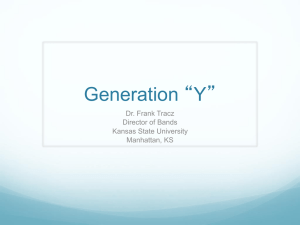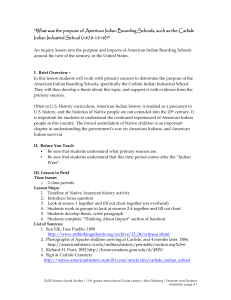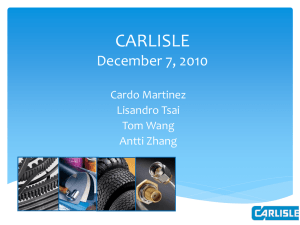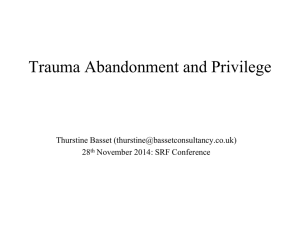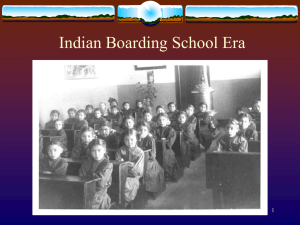Educating the Indian, Part 1 (L19) Residential Boarding Schools
advertisement
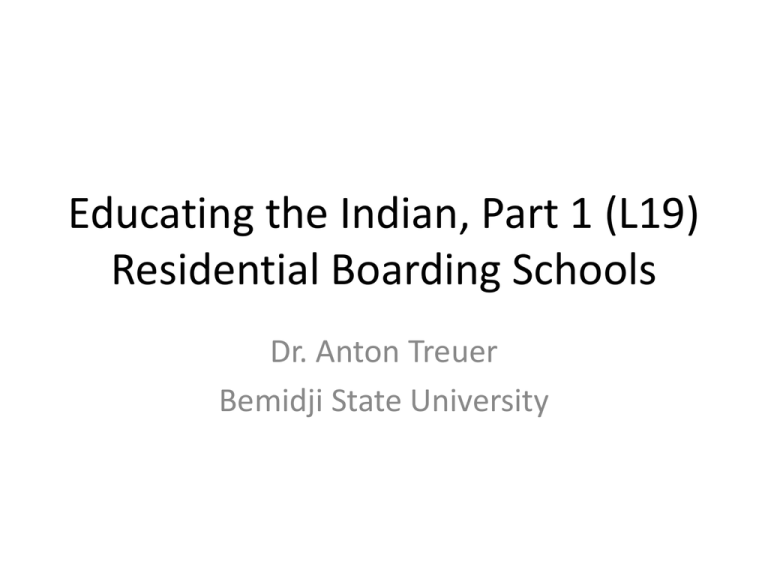
Educating the Indian, Part 1 (L19) Residential Boarding Schools Dr. Anton Treuer Bemidji State University Solving the “Indian Problem,” 1880s • Annihilate (war) • Concentrate away from white (removal & reservations) • Break up tribal control of remaining land (allotment) • Cultural assimilation (mission work & education) Indian Education Debate • John Oberly (BIA): gradual indoctrination, day schools for young kids, residential boarding schools for older kids • Captain Richard Henry Pratt (POW camp for Apache at St. Augustine, FL): immediate assimilation, “kill the Indian in order to save the man,” immediate residential boarding schools for all Indian youth “Our goal is to kill the Indian in order to save the man.” —Pratt Pratt with Apache prisoners at St. Augustine, Florida Carlisle Indian Industrial School, 18791918 • • • • • Not about GIVING an education About TAKING AWAY tribal culture Carlisle military barracks converted to school School was industrial Boys dug ditches, performed manual labor half day, girls sewed, cleaned, cooked half day Carlisle First US Congressional Committee on Indian Affairs, 1818 • “In the present state of our country, one of two things seems to be necessary: either that those sons of the forest should be moralized or exterminated.” T.J. Morgan, Commissioner of Indian Affairs, 1889-1893 • “I do not believe that Indians… people who for the most part speak no English, live in squalor and degradation, make little progress from year to year, who are a perpetual source of expense to the government and a constant menace to thousands of their white neighbors, a hindrance to civilization and a clog on our progress have any right to forcibly keep their children out of school to grow up like themselves, a race of barbarians and semi-savages.” Physical Make-over Conformity • Hair cut • Traditional clothes discarded, military uniforms • March to and from class • Beatings for speaking a tribal language Dislocation • Forcible removal from the home • No or limited parental contact (no visits, or only at parent expense, letters not sent) – government feared “lapse into old ways” and “parents pulling down their own kids” • Often sent 1,000+ miles away • Summers often with white families • Parents and extended family disempowered BIA Commissioner, 1899 • “This education policy is based on the well known inferiority of the great mass of Indians in religion, intelligence, morals, and home life.” After School • Kids pressured to find work and habitation far from reservations • Race barrier in U.S. made employment elusive • Many drifted back to reservations Home on the Rez • Many kids could not recognize their parents and vice versa • Many kids could not speak the same language as their own parents • They were often assimilated, but at a heavy price: emotional harm, destroyed families • Military effect: hard for volunteering adults, pure hell for 6 year kid BIA Boarding Schools (Government) • Carlisle, PA; Phoenix, AZ, Flandreau, SD • 25 govt. schools in operation by 1899 with 20,000+ new students every year • Carlisle had 58 tribes represented in final year of operation Private Mission Schools • Similar industrial model • Similar harsh punishments for speaking of tribal languages • Sexual abuse more commonly reported Bad Reputation • 1918 Influenza outbreak (nationwide) was especially devastating at the schools, 300 die at Haskell, KS, alone • By 1900 over half res. Boarding school kids had trachoma (eye disease) • Tuberculosis rampant • Poor diet for students reported • Carlisle, Haskell and other school kept cemeteries for kids (bodies not even sent home for burial) • Carlisle closes in 1918, but others enroll even more kids Meriam Report, 1928 • Blasts schools for poor nutrition, poor health care, insufficient clothing, exceedingly harsh physical punishment, disempowerment of parents John Collier, 1933-1945 • Tries to establish day school options • Great Depression & WWII actually increase enrollment – parents want kids fed and don’t often know what happens to their kids BIA Boarding Schools Today • • • • Santa Fe controlled by Pueblos Haskell now only all-Indian university in world Chilocco and Phoenix closed in the Reagan era Still a few in operation like Flandreau, but reformed Unintended Consequences • • • • Rise in pan-Indian sentiment Marriages, friendships Greater native resolve, common struggle Heightened sense of otherness Long Term Effects • In USA, grandparent generation went through system, and often 3 generations before them • In Canada, parent generation went through system (started later, ended later) • Generations of Indians with language and culture beaten out of them • How does one learn how to parent • Roots of identity issues, alcoholism, dysfunction Language Loss • 183 tribal languages spoken in USA and Canada today, only 20 still spoken by kids, only 4 with large vibrant language communities • Many speakers chose not to teach their kids to protect them from persecution Tribal Languages in U.S. & Canada Indian Attitude Towards Education • Still a widely held belief that getting an education means getting “white-washed” • Still a widely held belief that educated means assimilated • Still a widely held distrust of educators, school officials Education Achievement Apache Kids at Carlisle Before & After Year 1 Free Resources & Videos • http://vimeo.com/10098173 • http://www.pbs.org/indiancountry/history/bo arding.html • http://archives.cbc.ca/society/education/topic s/692/ Good Books • David Wallace, Education for Extinction: American Indians and the Boarding School Experience 1875-1928 • Brenda Child, Boarding School Seasons: American Indian Families, 1900-1940







